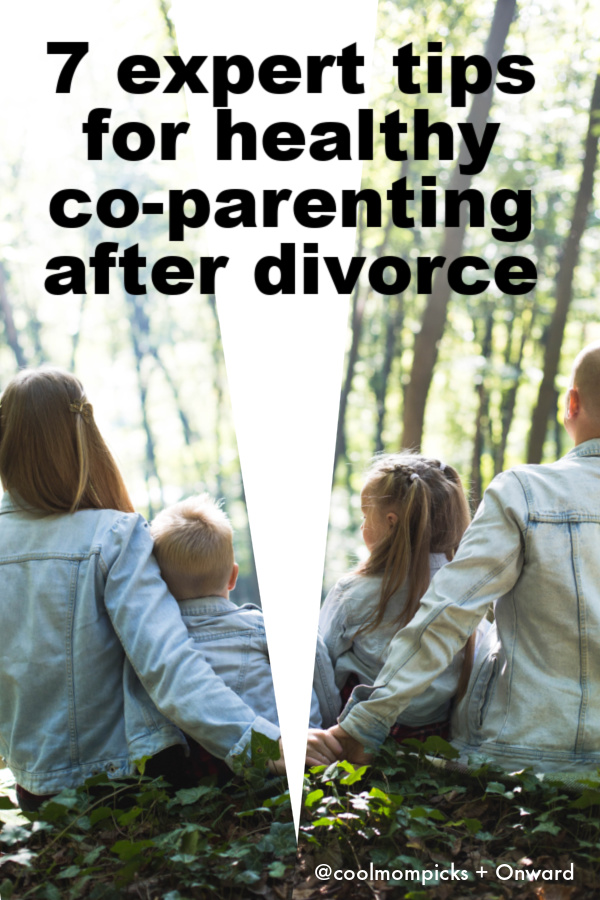Our team at Cool Mom Picks jokes that we have a lot of children among us, but the truth is, we have quite a few divorces and separations among us too. That means we’ve had a lot of experience trying to achieve healthy co-parenting, having navigated some admittedly tricky co-parenting situations at times.
Because we’re always reading tips on healthy co-parenting, we’re sharing some of the ones that have helped us the most. Because it’s hard. Really hard.
Anything to make a split easier, right? Especially on the kids.
We’re so grateful to bring this post to you on behalf of the Onward app, the smart, trusted platform that’s been helping co-parents create less stress around finances and bill-sharing — arguably one of the toughest parts of a split, even if you’re on the very best terms with your ex.
They’ve built their platform with the aim of creating more amicable communications about finances, and more automation when it comes to splitting costs, so you can avoid conversations you’d rather not have and avoid attorney expenses you’d rather not ring up.
We can say from experience, those are very very good things. (Plus, you can try Onward free for two weeks.)
With that, we hope these tips for healthy co-parenting help you as much as they’ve helped us.
Tips to help you create a healthier co-parent relationship with your ex.

1. Live by the adage “Love your kids more than you hate your ex.”
This is the advice our editor Liz first heard in one of those mandatory classes that New York State requires after a parental separation — and it’s become the guiding principle through which she’s navigated a split, and subsequently, a blended family.
Kids know that they’re part you, part their other parent. So when you say something negative, hateful, or hurtful about your ex to your kids, it puts them in an uncomfortable position of having to pick sides — or worse, believing that they might be some of those things too.
If you need to vent, find a trusted friend, a therapist, your own parent — anyone but your kids. Besides, in all likelihood it will get back to the other parent.
2. Encourage a healthy relationship between your kids and their other side of the family.
Divorce on its own doesn’t hurt children as much as poor parental relationships can. We hope that we can all agree that if your kids are able to have a good relationship with both parents they’re better off — and that includes the rest of their family.
Setting aside truly toxic or abusive relationships — in which case you need to get professionals involved, of course — it’s important that you do everything in your power to help encourage your kids’ relationship with their other parent. That means remembering to help them make Father’s Day or Mother’s Day cards, helping them birthday shop for grandparents, keeping the extended family in your kids’ orbit.
(Grandparents always love seeing more photos of the kids — and your ex will appreciate that you took the time to think of their parents too.)
It may be hard to always remain civil toward the other parent if things ended badly, but keep in mind that the way you behave toward your ex will also be giving your kids an excellent model for another kind of adult relationship.
3. Communicate, communicate, communicate.
There is so much you will need to navigate together when it comes to the kids that you can’t possibly have imagined when you put together a custody agreement. Think things like coordinating a limited number of tickets for your child’s performance or graduation. Navigating visiting days at camp. A change in your work situation that impacts your visitation schedule. A global pandemic.
If you can agree with your ex that you will both do your best to communicate calmly together, you will save so much time, energy and anguish.
If it’s difficult to talk (or email or text) without things becoming heated — or if you have an ex who tends to change the subject or go off on tangents –we love the American Psychological Association’s tips to write down all your talking points when you’re feeling fairly calm. Then when you sit down together or FaceTime, you have a guide to follow. And hopefully, to stick to.
4. Automate the financial stuff as much as possible.
It’s a lot easier both psychologically and practically to automate those child support payments or bills that need to be split. Ideally, you would each be billed for half of that little league fee, school trip, or college tuition — but billing doesn’t always work that way.
It’s one of the reasons we’re really excited about Onward.
![]()
The Onward app helps co-parents seamlessly share expenses, organize receipts, track where payments and repayments stand, and who owes what to whom for what so you can get repaid sooner.
That really helps keep things a lot more amicable for everyone, and that’s better for the kids, too.
Besides, you could save a ton of money on expensive attorneys if you’re able to manage outstanding payments through the app.
It’s ideal if you and your co-parent can both download the Onward app, but should they be unable or unwilling, Onward offers a handy invoicing tool for sending shared expenses. You’ll even be alerted when they open the invoice, so no one can pretend they didn’t see it or it got “lost” in their inbox. (Sigh.)
Bonus: You can CC your attorney on all communications, should that be helpful to you. It’s the kind of thoughtful feature you hope you don’t need, but it does create a paper trail that comes in handy for so many separated and divorced parents, however healthy their co-parenting relationship may be.
![]()
Special offer: Cool Mom Picks readers 14-day free trial to Onward for a limited time.
Just sign up through this link!
5. Be prepared for the unexpected.
Like we said above, so many issues will come up in the course of co-parenting that you hadn’t imagined. Lives change, and so do your kids, so be flexible.
Go easy on your ex if they need to pick up the kids a little late this week, or if they need to swap a Thanksgiving with you. You may need the favor returned one day, sooner than you think.
Plus, as your kids get older, they will have other priorities too. If they get invited to the sleepover party of the year during your scheduled parenting time, remember it’s not just your weekend. It’s theirs too. Sometimes we have to give up time with our kids to let them grow and if both parents can keep this in mind, you’ll have a better relationship with each other — as well as with your kids.
6. Remember: You don’t have to be friends with your ex.
Civility isn’t the same as friendship, and while it’s amazing if you’re one of the lucky people who have a civil relationship with your ex, it’s not required for having a healthy co-parenting relationship. In fact, experts actually caution against trying to be “friends” so quickly.
Psychologist Mark Travers explains that “Friendships based on civility are not likely to last as long, and those stemming from unresolved romantic desires can lead to heartbreak and jealousy.” He also suggests that a friendship may prolong the healing process, and stop you from gaining the closure you may need. It also can confuse the kids, especially younger kids, who may hold out hope for a reconciliation.
So if you want to stay friends, start by asking yourself why. What’s in it for you?
If nothing else, ask yourself, “How would I feel if my ex started dating someone else? Would we still be such great friends?” Only you know the answer to this.
7. Don’t make your kids the note-passers.
If things are really strained between you and the other parent, avoid putting your kids in the middle to pass along notes, changes of plans, and above all, any issues related to money.
You don’t ever want to put your child in a position where they are the ones to say, “Mom says you owe her a lot of child support.” It upsets the other parent, and it can be harmful for the kids. In other words, not a healthy co-parenting situation.
We get it — communication can be hard. That’s another reason we’re grateful for The Onward app. Maybe it eliminates some of that tension so you can sooner get on that path toward non-contentious discussions, and a healthy co-parenting relationship that benefits all of you the long run.
![]()
Thanks so much to our wonderful sponsor the Onward app for making a very tough time so much easier when it comes to managing finances and communicating about them.
If you have other tips that have helped you maintain a healthy, communicative relationship with your co-parent, feel free to share them in comments. We know you can never have too many tips.
Images: Nienke Burgers + Steven Van Loy on Unsplash




